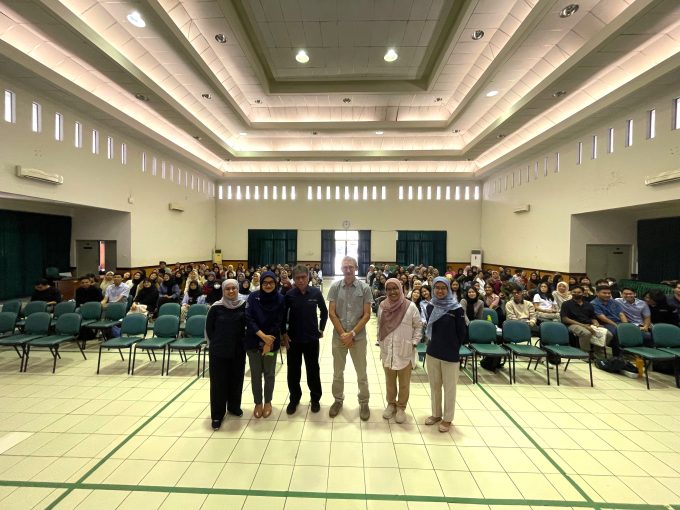
The Department of Food and Agricultural Product Technology welcomed Prof. Paul Van der Meeren from Ghent University, Belgium, as a guest lecturer on November 13, 2024. The lecture, titled “Food Applications of Nanotechnology: A Case Study of (Nano)Dispersions and Nano-emulsions,” was part of the Program Kompetisi Kampus Merdeka and aimed to provide students with valuable international exposure.
Open to the public and mandatory for undergraduate students enrolled in the “Physical Properties of Foods and Agricultural Products” course, the event was designed to cultivate students’ critical and creative thinking skills while introducing them to the latest advancements in food technology.
Prof. Van der Meeren began his lecture with an introduction to nanotechnology and nanoparticles, providing a comprehensive overview that spanned from fundamental concepts to formation processes. He delved into the science behind nano-dispersions and nano-emulsions, offering detailed explanations on how these structures are developed and stabilized.

The lecture also explored the wide-ranging applications of nanotechnology in the food industry. Prof. Van der Meeren discussed its use in food packaging, particularly in active packaging, edible coatings, and intelligent or innovative packaging. These technologies serve to extend shelf life and protect food from environmental factors, including light, oxygen, and microbial contamination.
Additionally, he highlighted the role of nanotechnology in the development of nutraceuticals—a hybrid of nutrition and pharmaceuticals designed to promote health and prevent chronic diseases. Examples included fortified fruit juices, tuna oil nanocapsules, and active canola oil formulations.
Prof. Van der Meeren also addressed the benefits and challenges of nanotechnology in food systems. Among the potential advantages are an extended shelf life, a reduced need for preservatives and pesticides, and an enhanced nutritional value. However, he cautioned against possible risks, particularly with long-term exposure, which may include environmental concerns, liver or kidney damage, and even carcinogenic effects. He emphasized that the future of nanotechnology in food will depend on its ability to solve significant global challenges, not merely serve commercial interests. Rigorous research and responsible innovation, he argued, are essential to ensuring safety and building public trust.
The lecture was met with enthusiastic participation, with numerous students engaging in a lively Q&A session. Through this session, Prof. Van der Meeren’s insights not only expanded the academic horizons of the students but also contributed to the advancement of the United Nations Sustainable Development Goals (SDGs)—particularly SDG 2 (Zero Hunger), SDG 3 (Good Health and Well-being), and SDG 12 (Responsible Consumption and Production).
By integrating scientific knowledge, technological innovation, and environmental responsibility, the application of nanotechnology in food holds great promise for a healthier, more sustainable future.
Written by: Anisa Quentina
